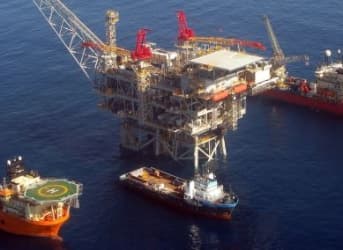In a U-turn, the antitrust commissioner in Israel says he’ll recommend the breakup of a partnership between Noble Energy of the United States and the local company Delek Group, which he says control too much of the gas reserves in the Mediterranean Sea off Israel’s coast.
The Israel Antitrust Authority at first had approved the two companies’ control of the Leviathan field, as long as they sold their holdings in two smaller gas wells. But Professor David Gilo, Israel’s influential antitrust commissioner, said he’d told officials from both Noble and Delek that he now opposed the arrangement.
As a result, Delek and Noble are left with two options: either they must sell their stakes in Leviathan separately or sell them jointly to a company that’s new to the offshore gas market and thus increase competition in Israel’s offshore gas industry.
Related: New Gas Field In Levantine Basin Could Hold 5 trillion Cubic Feet
Delek’s owner, Yitzhak Tshuva, met with Gilo the morning of Dec. 23 in an effort to persuade him not to oppose the deal. But in a statement later in the day, Gilo issued a statement saying, “The entry of Delek and Noble into Leviathan created a situation in which these groups control all of the gas reserves on the State of Israel’s coast.”
The Antitrust Authority still must hold a hearing on the matter and decided whether to accept Gilo’s recommendation. In the meantime, though, Israel’s energy stocks plunged by as much as 20 percent after Gilo’s statement became known.
Noble reacted angrily to Gilo’s decision with a statement by its CEO, Benjamin Zomer. “The likely decision of the commissioner to backtrack on the agreement casts a dark shadow on the future of the gas and oil industry in Israel and will affect Noble Energy’s investments in the country,” it said.
Zomer complained that for the past 16 years his company has invested nearly $6 billion to explore and develop Israel’s energy resources. “[T]hese investments boosted the economy and the environmental quality in Israel,” he said. “…while at the same time providing Israel with energy independence, with the opportunity for regional cooperation and a chance to add to the stability of the region.”
Allowing private companies to hold exclusive control over developing energy fields has become an important political issue in Israel ahead of parliamentary elections set for March 2015. Many opposition candidates accuse Prime Minister Benjamin Netanyahu’s Likud party of being too cozy with private companies that hold monopolies over the country’s important resources.
Related: Israel and Jordan Sign Gas Deal
Leviathan – the ancient Hebrew name for sea monster – is just that: an offshore field holding an estimated 22 trillion cubic feet of gas, one of the largest offshore gas fields found anywhere in the world in the past decade. Initial investment in Leviathan could reach as much as $6.5 billion, with production set to begin in 2018.
Delek Drilling and Avner Oil Exploration, which make up Delek Group of Netanya, Israel, holds 22.6 percent each of Leviathan. Noble Energy of Houston owns 39.66 percent. A third company, Ratio Oil Exploration of Tel Aviv, holds a 15 percent stake.
Delek and Noble also own just over 50 percent of the nearby Tamar field, which has estimated gas reserves of 10 trillion cubic feet. Production development at Tamar began in April 2013.
By Andy Tully of Oilprice.com
More Top Reads From Oilprice.com:
- The Untapped Potential of the Levant Basin
- Europe Needs A New Source of Oil and Gas, Fast
- How Broken Are The Energy Markets?


















